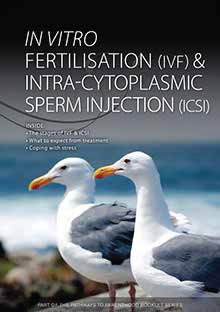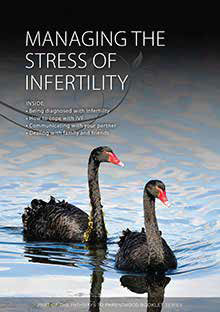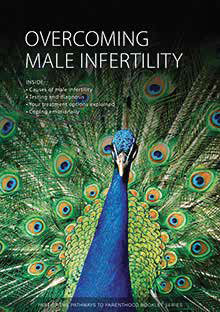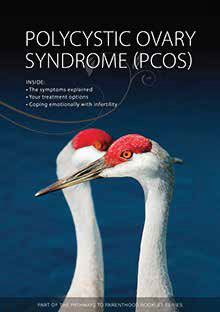Fertility Compounding
A couple sat to eat lunch with me after I had spoken at an infertility szymposium. As we began to talk, I asked the wife, "When you grieve over your infertility, what is your greatest loss?"
She didn’t have to think about her answer. "It's the loss of a dream; my heart’s desire is to have my husband’s child and raise it together."
turned to the husband and addressed him. "And you?"
He looked at her, then back at me. After hesitating a moment, he spoke to her gently, and stroked her arm, "Don't take this wrong, honey, but ..." Then he looked at me. "It's the loss of my wife—she is not the same woman I married. Infertility is really taking a toll on us."
"You’re normal," I assured them. After enduring a decade of infertility treatment that included multiple pregnancy losses, three failed adoptions, and an ectopic pregnancy, my husband and I had talked to numerous couples. And I recognized their stress, which-though different in each couple’s case—was still a normal response to an abnormal experience.
Infertility is hard stuff. In fact, "The depression and anxiety experienced by infertile women are equivalent to that in women suffering from a terminal illness," says Alice Domar, Ph.D., director of the Mind/Body Center for Women's Health in Beth Israel Deaconess Medical Center at Harvard Medical School .
Why is it so difficult? We're not talking about buying a new living room set here. We’re talking about having a child—someone who will throw her arms around you, even throw up on you. The idea of conceiving child as the product of two people’s love is a precious dream, and a deep longing. Thus, what a comfort it often is for couples to discover Proverbs 30:16, which tells us that a "barren womb" is among four things on earth that are never satisfied. The intense desire to have children is part of the way God structured the world. The drive, the longing, that "unsatisfied" feeling—these are part of the design.
- Encouragement for Couples Facing Infertility by Dr Alice Domar
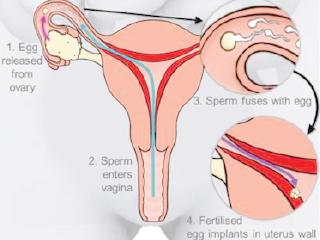
Infertility
Fertility is the ability to produce a child. Fertility requires healthy sperm from the male to successfully make its way to a healthy egg, penetrate the egg and then that egg is successfully implanted in the lining of the uterus. A problem at any of these steps can affect your fertility.
Infertility is defined as a couples' inability to conceive a child even though they've had frequent, unprotected sexual intercourse for a year or longer. According to the Mayo Clinic, infertility results from exclusively male infertility factors about one-third of the time, exclusively female infertility factors about one-third of the time, and a combination of male and female factors or an undeterminable factor about one-third of the time.
What Causes Infertility?
Health, Lifestyle and Other Risk Factors5% of women aged 25 take more than a year to conceive More than 70% of women under 30 conceive within 3 month 30% of women aged 35 take more than a year to conceive 40% of women aged over 36 conceive within 3 months By age 40, a woman's fertility has fallen by half
Both active and passive smoking affects fertility It changes in the cells of the ovary increasing the chance of genetic abnormalities, miscarriage and ectopic pregnancy May also accelerate the loss of eggs in women Lowers sperm count It is estimated that most of the negative effects of smoking on fertility are reversed a year after stopping smoking
Heavy drinking (more than 6 units of alcohol per week and no alcohol free days) can affect fertility, increase length of time for conceiving, and chances of having a healthy and live baby Excessive drinking can lower testosterone levels, cause erectile dysfunction, and decrease sperm production
Anabolic steroids, cocaine, and marijuana can have temporarily adverse effects on sperm production
Lead, mercury and industrial chemicals exposure may reduce fertility and increase the risk of miscarriage and birth defects
Can interfere with sperm producing hormone production
Medical Cause for Male Infertility
Male infertility is most often due to these factors:
Blockages that prevent the delivery of sperm; Low sperm count; and Misshapen or immobile sperm cells Injuries, poor lifestyle habits illnesses, and chronic health problems
Medical Cause for Female Infertility
A number of female factors can disrupt any step of this process, and female infertility may be caused by one or more disruptive factors. More specifically, infertility causes are traditionally grouped into categories among which are: endometriosis; ovulation disorders; damage to fallopian tubes (tubal infertility); and uterine or cervical causes.
Endometriosis Low sperm count; and Uterine or cervical causes
Fertility Information Booklet
Here is a selection of helpful fertility information booklets created by Merck Serono. These booklets have been designed to help support you in understanding fertility issues as well as provide you with information about the possible causes and treatments available. View and download the PDF versions ...
Please note the information provided here should not replace any information or advice provided by a medical practitioner or other members of your healthcare team. If you have any questions, please contact your fertility specialist.
Fertility drugs we routinely dispense are:
Compounded
Progesterone pessary 400mg Melatonin DHEA Progesterone capsules And many more ...
Off the Shelf
Clomiphene Citrate Gonadotrophins –eg, Menopur, Gonal F, Puregon, Ovidrel, Pregnyl Metformin Hydrochloride And many more ...
How We Can Help
We can work together with you and your IVF specialist in providing the medication needed during this process and give expert advice on what you’ve been prescribed. To promote reproductive health in men and women, we provide couples with fertility supplements.
We can supply all your IVF medication and treatment needs — both off-the-shelf and compounded (specially prepared) — and give expert advice on what you’ve been prescribed.






